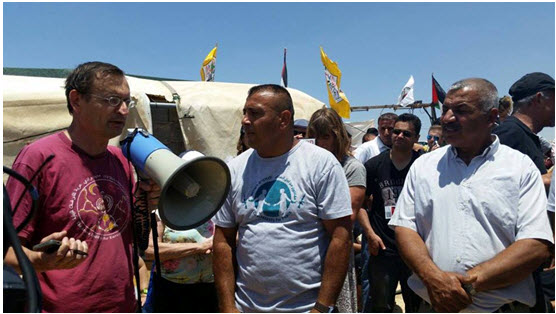Deputy Defense Minister and the new head of Israel’s Civil Administration for the Occupied Territories, Eli Ben Dahan, brazenly denied the existence of Susiya, a Palestinian West Bank village under threat of demolition, while speaking to the Knesset on Wednesday, July 22.

MK Khenin (left) during a demonstration on June 7, 2015, in Susiya, a Palestinian West Bank village under threat of demolition (Photo: Al Ittihad)
Ben Dahan, a MK from the HaBeit HaYehudi (Jewish Home) party – who once said that Palestinians are sub-human and that even homosexual Jews are superior to non-Jews – was responding to a formal query lodged by Hadash MK Dov Khenin (Joint List), who inquired whether it is true that the Civil Administration plans to demolish half of the village.
MK Khenin, who was visibly enraged by Ben Dahan’s remarks (you can view a video of the exchange here, in Hebrew), responded: “I have not heard such a response so detached from reality in a long time.” He then went on to quote Plia Albeck, a pro-settler former government official who oversaw legal decisions regarding West Bank land, and who herself admitted in 1982 that the old synagogue in what is now the Jewish settlement of Susiya is “surrounded by an Arab village,” and that the land is registered in the Israel Lands Authority as being privately owned by Arabs.
The Israeli occupation army, however, never gave Susiya’s residents permission to build their homes on the current location. Susiya is located in the south Hebron Hills, in Area C of the West Bank, which according to the Oslo Accords is under full Israeli control. The reason Palestinians in the south Hebron Hills build illegally is because Israeli authorities systematically refuse to grant them building permits or recognize any planning rights. The Israeli army rejects most of Palestinian planning requests in Area C, and most villages in the area face almost identical restrictions and demolition threats. Settlements for Israelis, however, continuously pop up in the area.
Related:


